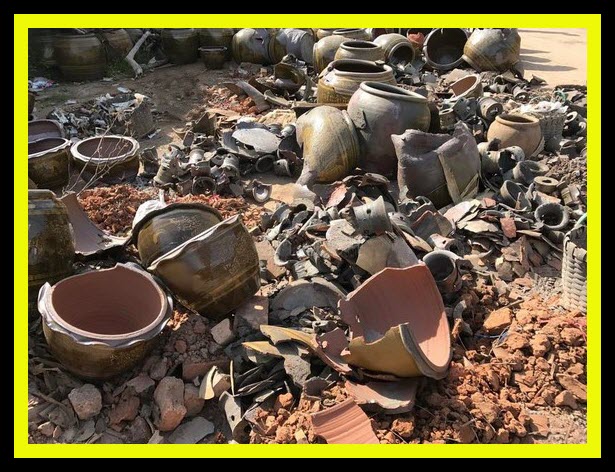
Q: “YOU KNOW THE WORD SHOULD BE “LAIN” NOT “LIEN”
DON’CHA?”
A: “MMMM! THANKS FOR THAT!”
“Though ye
have lien among the pots, yet shall ye be as the wings
of a dove covered with silver, and her feathers with yellow gold.”
(Psalm 68:13)
Now one of the rules to understand the Bible is to not
make
assumptions … as with the above title.
That is, before we tell what it means, serious
Bible students
study as to what it says.
In other words we should try real hard not to bring the
Bible down to
our level of ignorance.
Despite the fact that you might have several advanced
doctorates in
Greek or Hebrew or Swahili, the plain ol’ English of the King James
Bible has a
sneaky way to humble us all.
Put it this way “Why should the man who mucks out a pig
stall have any
less knowledge and understanding of the Bible than a University
lecturer in
religion, just because he doesn’t know ‘da Hebrew or da Greek’? He
doesn’t need
to … if he knows da’ English!
The following is a prayer for any serious budding Bible student: “Dear Lord,
that word doesn’t seem right, but I know you have chosen it for a
reason.
Please humble my heart to find out what it says before I start yapping
on about
what I think it should be or what it means. I will not change any word
to suit
me, but I will change me to suit the words you have chosen. Please give
me
understanding. Amen.”
Now the word “lien” is given three times
in the Bible, and
the word “lain” is mentioned six times.
So we have start thinking that if “lain” is the word
meant, then God could,
and indeed would, have used it. Did the 1611 Translators made a
mistake? Has
God fumbled the ball?
Should the verse be as follows: “Though
ye
have lain among the pots, yet shall ye be as the wings of a
dove covered
with silver, and her feathers with yellow gold.” (Psalm 68:13).
I mean it
makes more sense doesn’t it?
There is
your poor ol’ downtrodden Israelite, in bondage, in chains, and
under the whip in Egypt, so what could be a more fitting word than lain
… you know lying down, nay, beaten down, among the pots … the pots they
have been
forced to make along with the mud bricks while under crushing Egyptian
domination.
However,
to a person with a Dictionary, and any publisher will do, they
will discover that “lien” is a legal term meaning that someone
has the
rights over someone else property.
In more
correct terms “A lien is a legal claim to assets used to
secure the repayment of a debt or loan. When a lien is put on a house,
for
example, creditors gain a legal right to pursue the property if the
schedule
payments of a loan go unmet.”
Well, how does this apply to captive Israel in Egypt.
Initially Israel were doing great and God was blessing
them hand over
foot. As the Bible says “And
the
children of Israel were fruitful, and increased abundantly,
and multiplied,
and waxed exceeding mighty; and the land was filled with them.”
(Exodus
1:7).
In
a word,
Israel were going gangbusters! Why? God had given Egypt to Israel … the
land
was theirs, and while Pharoah was meeting his ‘payments’ to Israel
by
letting them prosper, it was all sweet with God.
However “…
there
arose up a new king over Egypt, which knew not Joseph.” (Exodus 1:8)
and this is where it starts to go pear-shaped
(downhill) for Egypt. From the time Israel entered Egypt to the Exodus,
was 215
years, with the first 71 years being fruitful and waxing as described
above. It
is only the last 144 years of Israel’s time in Egypt, that they serve
with
rigour, with their lives being made bitter with hard bondage (Exodus
1:13-14).
What
does all
this mean?
Egypt
was not
meeting its payments to Israel, who had been given the land by God
to dwell
in and prosper, and so the lien over Egypt begins. And we all know the
end
result – Israel exit Egypt and take all Egypt’s wealth with them, that
is, they
clean them right out! As the Bible says “...and they spoiled the
Egyptians.”
(Exodus 12:36).
In
summary
let’s go over the definition of the lien that Israel had over Egypt.
“Israel
had lien, a legal claim, over Egypt and its assets, as the land
was God gift to Israel. Owing to non-payment over a period of 144 years
of hard
bondage, Egypt failed to keep its commitments/repayments, to Israel. As
a
result, Israel, as the creditor, gain a legal right to pursue the
property of Egypt
as the schedule of payments (letting them prosper, waxing, multiplying)
toward
Israel was lapsing and had lapsed.”
So
lets go
back and put all this into context.
“Though ye
have lien among the pots, yet shall ye be as the wings
of a dove covered with silver, and her feathers with yellow gold.”
(Psalm 68:13)
Yes,
while
Israel was among the pots, serving with rigour and hard bondage,
paradoxically,
they had a lien over Egypt. Egypt’s property was theirs in the future.
Egypt’s
house was already Israel’s house as it were. Although slaves, they were
future
rich slaves with legal rights to come. Israel had a lien over Egypt
that would
come to fruition after 144 years.
But
did we
need to go through all that to know that Israel was not just laying
about in
Egypt among the pots?
NAY!
The
second
half of the verse reveals that the correct word is “lien” not “lain”.
Israel
were not just laying about in the pots, they had an unknown lien that
only God
knew anything about!
“Though ye
have lien among the pots, YET SHALL YE BE AS
THE WINGS OF A DOVE COVERED WITH SILVER, AND HER FEATHERS WITH YELLOW
GOLD.”
(Psalm 68:13)
Bam! Right
between the eyes! Over the plate waist high! There is the
meaning of the word “lien” because of the context.
In the
first half of the verse, Israel are poverty stricken slaves but with
a future lien over Egypt … they SHALL (future) be blessed with
material
goods.
The second
half of the verse shows you that Israel, as history shows,
bankrupted Egypt, and went on their way with wings of a dove and
covered with
gold.
That is, they
flew out of Egypt with all the goodies as a result of
their lien.
Harley
Hitchcock
This
website’s front page is:
www.AustralianBibleMinistries.com

“NO
LANGUAGE NO CULTURE”
“CONTACT US”


